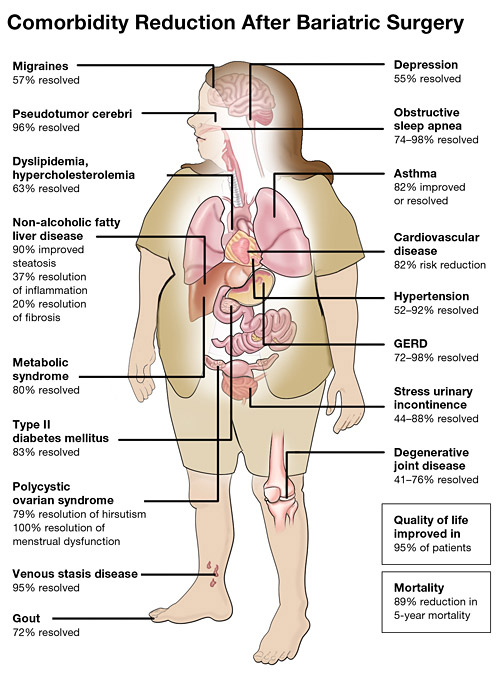The Bariatric Center at Inland Valley Hospital
The Bariatric Center at Southwest Healthcare Inland Valley Hospital has been designated a Bariatric Surgery Comprehensive Center by the Metabolic and Bariatric Surgery Accreditation and Quality Improvement Program (MBSAQIP). To become certified, the Bariatric Center was required to satisfy or exceed requirements in categories, including:
- Annual number of cases
- Complication rates
- Long-term follow-up and support
- Ongoing quality improvement
- Bariatric evidence based practice
- Continuing education for staff and patients
 Weight-Loss Surgery Assessment
Weight-Loss Surgery Assessment
Are you a candidate for weight-loss surgery? This assessment can help determine if weight-loss surgery is right for you.
Patients seek bariatric surgery to reduce the number of obesity-related complications like heart disease, stroke, sleep apnea and diabetes. And then also to reduce their body weight, look better and feel healthier and more energetic.
Minimally invasive, laparoscopic bariatric surgery at The Bariatric Center reduces the size of the stomach to limit the amount of food eaten. Also, this procedure requires a smaller incision, usually involving less pain and faster recovery.
Bariatric Surgery Blue Distinction® Centers

Inland Valley Hospital has earned the Blue Distinction® Centers+ for Bariatric Surgery designation by BCBS.
Calculate body mass index (BMI)
David Suh, MD, who was trained at the University of California, San Francisco, utilizes the laparoscopic technique for patients who are excessively overweight. "This is the surgical solution many dangerously overweight patients have been waiting for," says Dr. Suh. "It offers the same permanent weight loss without the pain, disability and complications that can result from major abdominal surgery."
Patient success stories
Watch the stories of three patients who successfully lost pounds after having weight-loss surgery at Inland Valley Hospital in Southern California.
Regain control of your health and mobility
Being seriously overweight can lead to life-threatening medical conditions such as severe diabetes, high blood pressure, sleep apnea, gastroesophageal reflux and heart disease. As the pounds come off after surgery, health problems can dramatically improve or disappear entirely.
The National Institutes of Health (NIH) recommends laparoscopic bariatric surgery as the best long-term solution for extreme obesity. Because of NIH guidelines, more private insurers are offering coverage for bariatric surgery. Like any other surgical procedure, bariatric surgery comes with risks, and diet and exercise should always be attempted as a first choice for losing weight.
“We do a psychological assessment and have our patients meet with a dietitian,” says Stephen Dada, MD, a bariatric surgeon at Inland Valley Hospital. “When ‘comfort foods’ are taken away – some may be off-limits after surgery – the person has to be able to handle it.”
Results vary somewhat depending on sex, initial weight and age. In general, a physician will recommend weight-loss surgery when the risks of continued obesity are greater than the risks of surgery, such as when a patient is 100 pounds overweight or has diabetes, high blood pressure or a similar serious medical condition.
“It’s about selecting the right procedure for each individual patient’s needs, and building a foundation of trust by treating each patient as a special person,” says Francis A. Essien, MD, a bariatric surgeon at Inland Valley Hospital. It's important to be aware that weight-loss surgery may be the most effective treatment for long-term obesity.
Podcast: Weight-loss Surgery
Learn more about bariatric surgery as a tool to aid in the long-term weight loss that could improve the quality of the rest of your life in this educational podcast.
The alarming obesity trend
Nearly 40 percent of Americans can be considered obese, according to the Centers for Disease Control and Prevention. "There's an alarming trend among the population toward obesity," Dr. Suh says. "It is a problem that a lot of people have their entire lives. They also develop medical conditions — such as severe diabetes — that can affect the length and quality of their lives."
For many who are dangerously overweight, diet, exercise and drug therapy have not provided a lasting solution. Now, laparoscopic techniques can make surgery easier on the patient than standard, major abdominal surgery. And more private insurers now are offering coverage for bariatric surgery.
Health impact and saving lives
Individual results may vary. There are risks associated with any surgical procedure. Talk with your doctor about these risks to find out if bariatric surgery is right for you.
Volumes and outcomes
| Surgeries performed 2019-2021 | 1,162 | 708 |
| 2019-2021 rates of occurrences SWHCS: | ||
| Surgical site infection | 0.00% | 0.001% |
| Bleeding | 0.01% | 0.01% |
| Leak | 0.00% | 0.00% |
| Re-admission | 0.01% | 0.02% |
Bariatric Pre-op Educational and Dietary Videos
Get the important info you need to know for your weight-loss surgery in this three-part online seminar.


